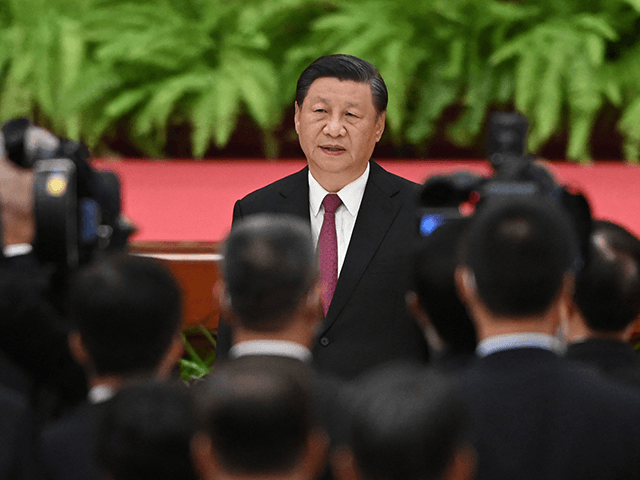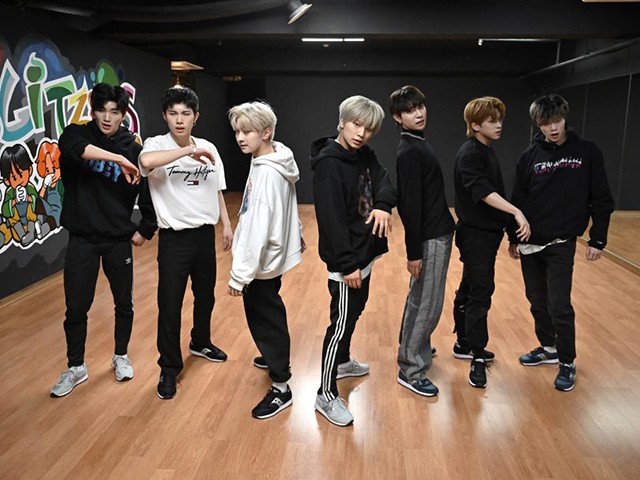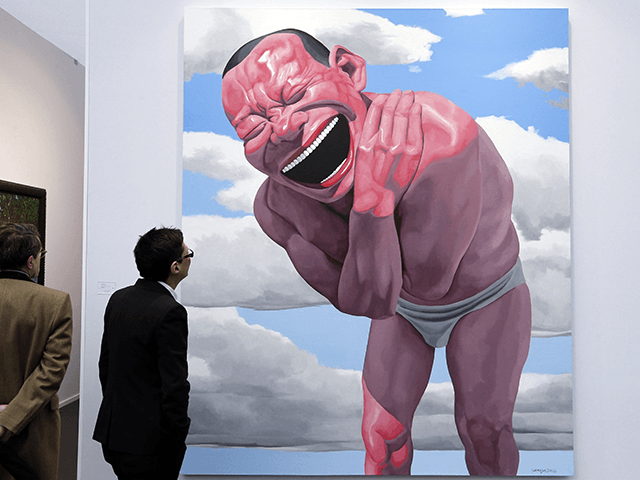Chinese dictator Xi Jinping on Tuesday warned artists to create only “healthy” art that extols the virtues of “socialism with Chinese characteristics,” or else “the people will not accept it” – a not-very-veiled warning that Xi’s totalitarian government will punish artists who challenge the Chinese communist ideology.
Xi made his remarks in an address to the 11th National Congress of China Federation of Literary and Art Circles, which was held concurrently with the 10th National Congress of China Writers Association.
China’s state-run Global Times noted admiringly that Xi spoke as not only “president” of the government in Beijing, but also “general secretary of the Communist Party of China Central Committee and chairman of the Central Military Commission.”

Xi Jinping sings the national anthem during a reception at the Great Hall of the People on the eve of China’s National Day in Beijing on September 30, 2021. (Photo by GREG BAKER/AFP via Getty Images)
Oblivious to the ugly authoritarianism inherent in unelected leaders with multiple executive titles handing down marching orders to conclaves of State- directed “artistic” institutions, the Global Times gushed over Xi’s “advice” to content creators:
Chinese literature and art should not become a creator, follower or advocator of an unhealthy social climate, Xi said, noting that art cannot be the slave of the market, and artists should abide by moral standards.
Writers and artists should cherish their social influence, seriously consider the social effects of their works and, if they commit misconduct, the people will not accept it.
President Xi once said that socialism with Chinese characteristics is a great cause of comprehensive development and there can be no socialist modernization without the prosperity and development of socialist culture.
The Global Times noted this advice already has considerable state muscle behind it, as China’s “cultural authorities” have been “stepping up efforts to strengthen regulation on entertainment companies and entertainers as part of China’s effort to promote the healthy development of the industry.”
“In November, China’s top internet regulator announced it established a ban list to prevent celebrity-related content from promoting distorted values, including abnormal aesthetics, vulgar scandals, and content that induces fans to blindly idolize celebrities or hypes the comeback of entertainers who have illegal and unethical records,” the Chinese Communist Party (CCP) paper recalled.
This was a reference to China’s crackdown on “fan culture,” which cynical observers saw as an effort to purge South Korean influence from Chinese Communist culture. Some South Korean pop singers have become enormously popular with Chinese young people, who have a tendency to become obsessed with celebrities.

This picture taken on April 29, 2021 shows members of the K-pop boy band Blitzers performing during their dance practise session at a rehearsal studio in Seoul. (Photo by JUNG YEON-JE/AFP via Getty Images)
The prohibited “abnormal aesthetics” the Global Times referred to include “girlie” or “sissy” behavior by male TV and movie personalities. The edict from China’s television regulators in September specifically instructed broadcasters to “resolutely put an end to sissy men and other abnormal esthetics.”
This was also taken by foreign observers as an effort to curtail the influence of South Korean and Japanese pop stars, whose popularity has been encouraging young Chinese entertainers to emulate their style. The Communist Party feels that style is “vulgar” and not “masculine” enough, so broadcasters were ordered to “vigorously promote excellent Chinese traditional culture, revolutionary culture and advanced socialist culture.”
The Communist Party is also cracking down hard on video games, ostensibly because they distract young people from focusing on work and education, and as one of China’s many “artistic” administrations said over the summer, “adolescents are the future of the motherland.”
Foreign analysts postulated in August that the Communist Party has another, less clearly stated fear: online games bring Chinese youth into unregulated contact with too many foreigners, allowing them to socialize with people who don’t live under Communist domination, exposing them to ideas that might not flatter “socialism with Chinese characteristics,” and giving Chinese students opportunities to organize for political action.

COMMENTS
Please let us know if you're having issues with commenting.